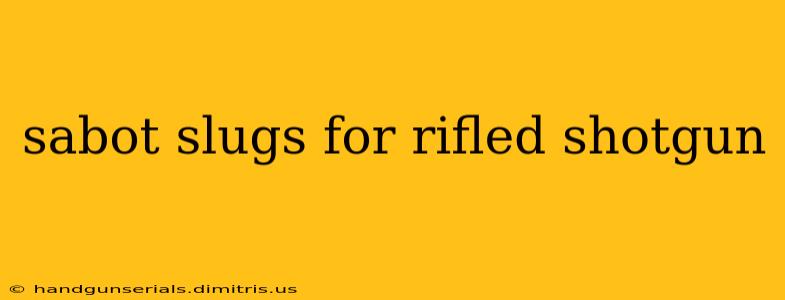Shooting slugs from a shotgun offers a unique blend of power and accuracy, particularly desirable for hunting larger game or engaging in long-range shooting. While smoothbore shotguns can fire slugs, rifled shotgun barrels significantly enhance accuracy. This is where sabot slugs come into play, offering a compelling advantage for hunters and shooters alike. This guide delves into the world of sabot slugs, exploring their benefits, types, and considerations for optimal performance.
What are Sabot Slugs?
Sabot slugs are specialized shotgun projectiles designed for use in rifled barrels. Unlike traditional rifled slugs, which have their own rifling, sabot slugs feature a smaller, typically lead or other metal, projectile encased within a plastic or polymer "sabot." This sabot acts as a carrier, engaging the rifling of the barrel to impart spin stability. Once the slug exits the barrel, the sabot separates, leaving the projectile to fly true to its trajectory.
This design offers several key advantages:
- Increased Accuracy: The spin imparted by the rifling significantly improves accuracy compared to foster-type slugs fired from a smoothbore or even traditional rifled slugs in a rifled barrel. This enhanced stability leads to flatter trajectories and tighter groupings at longer ranges.
- Higher Velocity: The smaller diameter of the projectile within the sabot often allows for higher velocities compared to traditional rifled slugs, further increasing range and accuracy.
- Reduced Recoil: In some cases, the lighter weight of the sabot slug compared to a solid rifled slug can result in less felt recoil.
Types of Sabot Slugs:
Several types of sabot slugs exist, each with its own characteristics:
1. Lead Sabot Slugs:
These are the most common type, utilizing a lead core within the sabot. They are generally affordable and offer good performance, but their lead composition might be restricted in certain areas due to environmental concerns.
2. Copper Sabot Slugs:
Copper sabot slugs offer superior ballistic performance compared to their lead counterparts, boasting higher velocities and improved accuracy. They are also environmentally more friendly but come at a higher price point.
3. Hybrid Sabot Slugs:
Hybrid sabot slugs aim to blend the best qualities of both lead and copper slugs, often incorporating a combination of materials for enhanced performance and cost-effectiveness.
Choosing the Right Sabot Slug:
Selecting the right sabot slug depends on various factors:
- Caliber: Ensure the sabot slug is compatible with your shotgun's gauge (e.g., 12 gauge, 20 gauge).
- Intended Use: Hunting requires different considerations than target shooting. Hunting slugs prioritize stopping power and accuracy at shorter to medium ranges, while target shooting often demands exceptional precision at longer distances.
- Rifling Type: The specific rifling pattern of your shotgun barrel will influence sabot slug performance. Some slugs are designed for specific rifling types for optimal results.
- Range: Longer-range shooting often benefits from slugs with higher ballistic coefficients and greater stability.
Safety Considerations:
Always handle firearms responsibly. Always wear appropriate eye and ear protection when shooting sabot slugs. Never point a firearm at anything you do not intend to shoot. Familiarize yourself with the specific safety instructions provided by the ammunition manufacturer and your firearm's documentation. Additionally, always check your state and local laws regarding the use of shotguns and slugs before hunting.
Conclusion:
Sabot slugs offer a significant advancement in shotgun ammunition, enabling improved accuracy and range for both hunting and target shooting when used with a rifled barrel. By understanding the different types of sabot slugs and considering the factors discussed, you can make an informed choice to optimize your shooting experience. Remember to always prioritize safety and adhere to responsible firearm handling practices.

